For more information about the characteristics and activities of Cold Food Festival, as well as its deep cultural meanings, please follow this article.
1 What is Cold Food Festival?
In folk culture, Cold Food Festival is also called Floating Cake and Vegetarian Cake Festival (“Cold Food” means “cold food”). It is celebrated on the third day of the third lunar month. Cold Food Festival is mainly celebrated in China and Vietnam.
Cold Food Festival is known as a traditional festival in Vietnam. In Chinese, “Cold Food – 寒食” means “cold food”. Every time Cold Food Festival comes, people will make floating cakes and vegetarian cakes to worship their ancestors on the 3rd of March of the lunar calendar every year.
 What is Cold Food Festival?
What is Cold Food Festival?
Giu Vai Thoi was a wise man who accompanied Tan Van Cong, the king of Tan, for nineteen years, enduring hardships and training to become talented. Later, Tan Van Cong regained his kingship, returned to rule the kingdom of Tan, and rewarded those who had helped him greatly during his exile. However, he forgot about Giu Vai Thoi. Giu Vai Thoi did not feel any resentment towards the king. He thought that following and assisting the king was what he should do, and that those deeds were not worth mentioning.
Therefore, he returned home and took his mother to live in seclusion in Dien Son Mountain. Later, when King Tan remembered Giu Vai Thoi, he sent people to look for him. But Giu Vai Thoi refused to return to receive the reward. King Tan then ordered the mountain to be burned down (to force Giu Vai Thoi to come out). Unfortunately, Giu Vai Thoi and his mother both died in the fire.
The king was deeply saddened and regretted his actions, so he built a temple to worship Giu Vai Thoi and ordered the people to abstain from lighting fires for three days and only eat pre-cooked cold food to commemorate him.
2 When is Cold Food Festival 2024?
In 2024, Cold Food Festival will be celebrated on the third day of the third lunar month, which falls on Thursday, April 11th, in the Gregorian calendar.
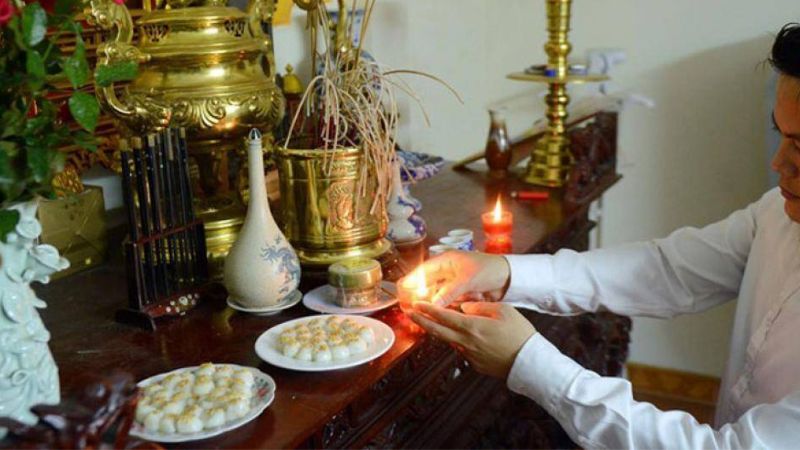 Cold Food Festival 2024 is on April 11th in the Gregorian calendar
Cold Food Festival 2024 is on April 11th in the Gregorian calendar
3 Origin and Meaning of Cold Food Festival
The Legend of Cold Food Festival
Cold Food Festival is closely associated with the legend of “Giu Vai Thoi’s death by fire”. The story took place during the Spring and Autumn period when Tan Van Cong, the king of Tan, met Giu Vai Thoi and was assisted by him to regain his kingdom. However, after reclaiming his throne, the king forgot about Giu Vai Thoi’s help when rewarding those who had contributed to his cause.
 The Legend of Cold Food Festival
The Legend of Cold Food Festival
Despite this, Giu Vai Thoi did not feel any resentment and returned to take his elderly mother into the mountains to live in seclusion. Some time later, when the king remembered Giu Vai Thoi, he sent people to look for him. But Giu Vai Thoi refused to return to receive the reward. The king then ordered the mountain to be burned down to force him to come out, but this resulted in the deaths of both Giu Vai Thoi and his mother on the third day of the third lunar month. The king was filled with sorrow and regret, so he built a temple to worship Giu Vai Thoi and ordered the people to abstain from using fire for three days, only consuming pre-cooked cold food to remember him.
The Significance of Cold Food Festival
In Vietnam, Cold Food Festival has been combined with the Festival of Floating Cakes and Vegetarian Cakes, and when it was adopted by the Vietnamese, it became a festival that showcases the unique culture and way of life of the Vietnamese people. Cold Food Festival in Vietnam carries the significance of honoring ancestors and remembering the contributions of the deceased.
Every Cold Food Festival, family members gather together for a reunion dinner. On this day, Vietnamese families will prepare floating cakes and vegetarian cakes to worship Buddha and their ancestors, and in some places, they even offer them to the village gods to express their sincerity.
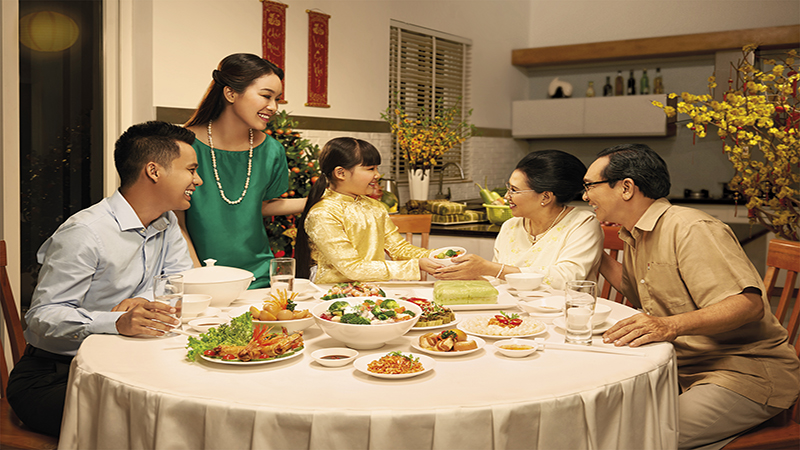
The offerings for Cold Food Festival include incense, flowers, fresh fruits, betel, and areca nuts. Spiky or thorny plants are avoided. There must also be a glass of clean water on the altar to symbolize the pure and peaceful mind of the host family during the ceremony.
Additionally, the offerings for Cold Food Festival must include floating cakes and vegetarian cakes. There should be either five or three plates of floating cakes and three bowls of vegetarian cakes presented on the altar.
4 Customs and Traditions of Cold Food Festival in Vietnam
Custom of Eating Floating Cakes and Vegetarian Cakes
Floating cakes and vegetarian cakes are characteristic of Vietnamese culture during Cold Food Festival. As a result, floating cakes are also known as “Cold Food Cakes”.
For more information: 2 clear and sweet drinks that are easy to make at home
According to Tran Quang Duc, a folk culture researcher, the custom of eating floating cakes and vegetarian cakes during Cold Food Festival in Vietnam began during the Later Le Dynasty (1533 – 1789). In his writings about folk culture, Le Quy Don also mentioned that “The most important custom in our country is eating floating cakes on the third day of the third lunar month.” This highlights the long-standing tradition of eating floating cakes and vegetarian cakes in Vietnam.
For more information: delicious dishes that are easy to make at home

Floating cakes and vegetarian cakes are familiar dishes during Cold Food Festival, carrying many beautiful meanings and representing the essence of Vietnamese culture.
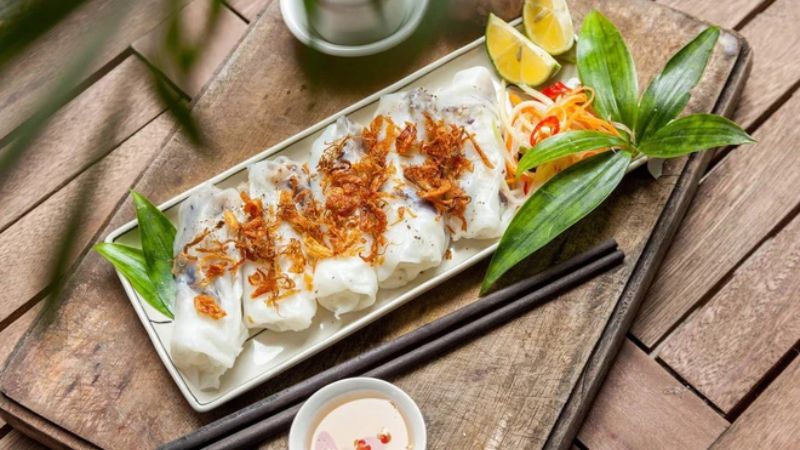 Custom of eating floating cakes and vegetarian cakes
Custom of eating floating cakes and vegetarian cakes
Both cakes are made from glutinous rice flour, reflecting the cultural significance of the Vietnamese water rice civilization. The round shape of the floating cakes and vegetarian cakes, arranged together in rows, evokes the legend of “Mother Au Co and the Hundred Eggs”.
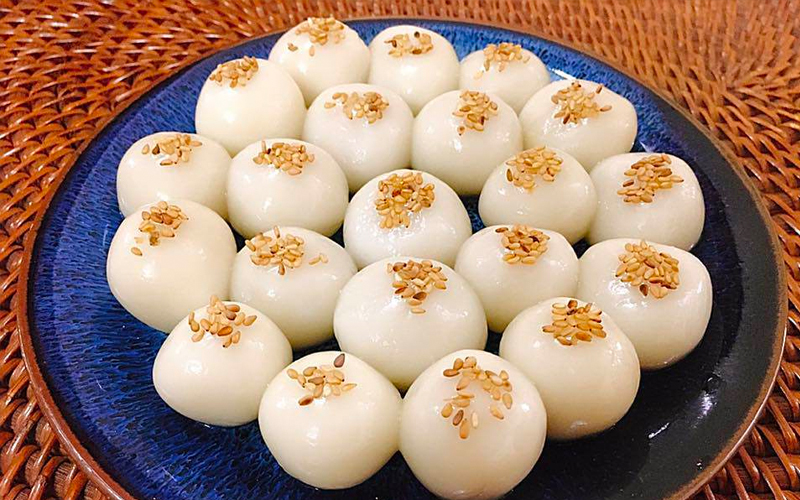 The round, white cakes arranged together remind us of “Mother Au Co and the Hundred Eggs”
The round, white cakes arranged together remind us of “Mother Au Co and the Hundred Eggs”
The Significance of Floating Cakes and Vegetarian Cakes during Cold Food Festival
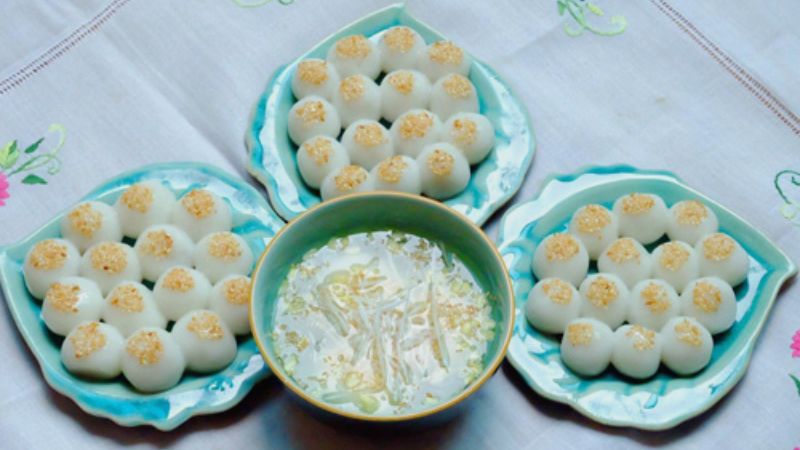 Cold Food Festival – what to offer?
Cold Food Festival – what to offer?
Floating cakes and vegetarian cakes are made from glutinous rice flour, symbolizing the cultural significance of the Vietnamese water rice civilization, similar to the square sticky rice cakes and round sticky rice cakes.
The round shape of the floating cakes and vegetarian cakes represents the tradition of “remembering the source when drinking water”. Floating cakes symbolize the 50 children who followed Mother Au Co to the sea, while vegetarian cakes represent the 50 children who followed Lac Long Quan into the mountains to build a happy and prosperous life.
Custom of Eating Bánh Cuốn (Rolled Cake)
 Custom of eating Bánh Cuốn
Custom of eating Bánh Cuốn
In addition to floating cakes and vegetarian cakes, rolled cakes are also considered a traditional food during Cold Food Festival, according to historical records. The custom of eating rolled cakes during Cold Food Festival is believed to have originated during the Tran Dynasty and has been passed down to the present day.
For more information: A collection of 12 delicious dishes that can be easily made at home
5 What to Offer During Cold Food Festival?
On the third day of the third lunar month every year, families usually prepare offerings to worship their ancestors and Buddha, with the main dishes being floating cakes, vegetarian cakes, betel, areca nuts, incense, and fresh flowers. It is believed that odd numbers bring good luck, so the number of floating cakes and vegetarian cakes offered is usually three or five bowls.
6 Frequently Asked Questions About Cold Food Festival
What Are the Taboos of Cold Food Festival?
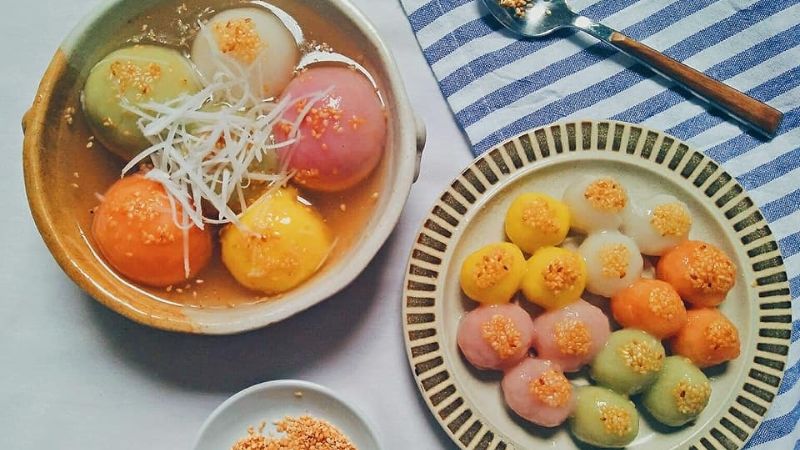 What are the taboos of Cold Food Festival?
What are the taboos of Cold Food Festival?
In addition to the rituals that need to be performed, there are also important taboos to be observed during Cold Food Festival, including:
- Do not offer multi-colored floating cakes: Cold Food Festival is a day to worship ancestors and Buddha, so simplicity and purity are important. Therefore, only offer white floating cakes.
- Do not move to a new house: According to folk beliefs, the spirits of the deceased usually follow the family closely. Moving to a new house during Cold Food Festival is considered disruptive and inauspicious.
- Do not offer thorny or bitter fruits: This is to avoid bringing misfortune, sorrow, and a life filled with bitterness and difficulties.
- Do not offer lilies, chrysanthemums, or marigolds: These flowers are believed to bring bad luck to the family.
How is Cold Food Festival Different from Tomb-Sweeping Day?
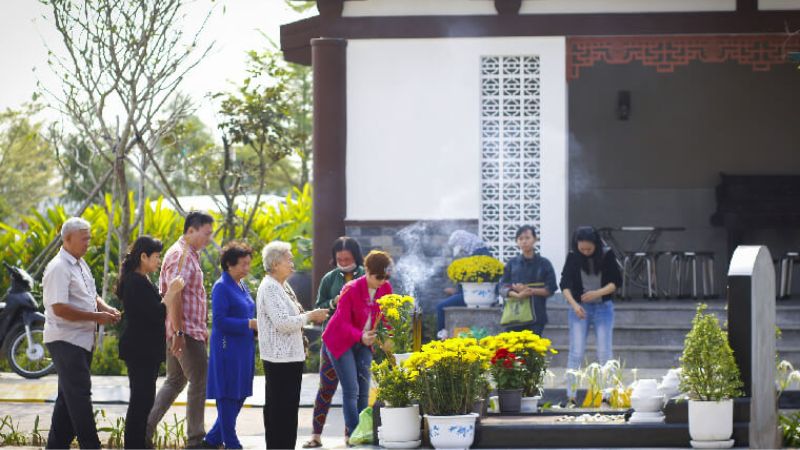 How is Cold Food Festival different from Tomb-Sweeping Day?
How is Cold Food Festival different from Tomb-Sweeping Day?
As Cold Food Festival and Tomb-Sweeping Day sometimes overlap, many people confuse the two festivals. However, they have completely different meanings.
During Cold Food Festival, families prepare offerings to worship their ancestors and Buddha, expressing their gratitude and respect. They gather together to eat floating cakes and vegetarian cakes, wishing for good luck and happiness for their family.
On the other hand, Tomb-Sweeping Day is an occasion for descendants to visit and clean the graves of their ancestors to show their respect and remembrance. Additionally, Cold Food Festival is celebrated on a fixed date every year, the third day of the third lunar month, while Tomb-Sweeping Day does not have a fixed date and falls on a day in the third lunar month.
Is Cold Food Festival a Vietnamese or Chinese Tradition?
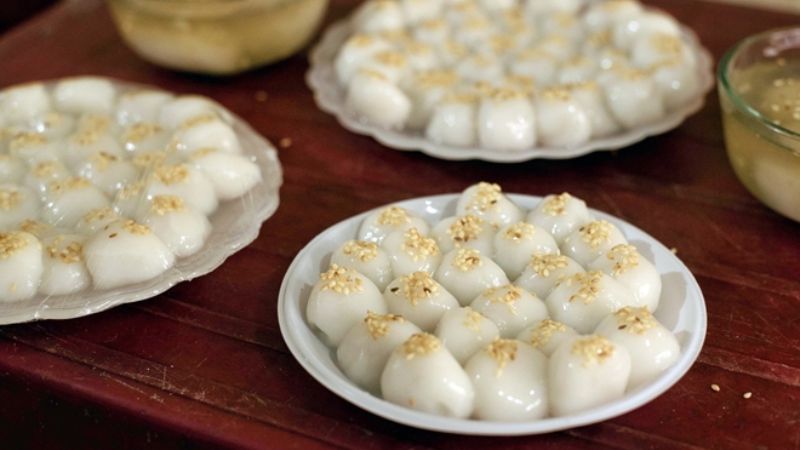 Is Cold Food Festival a Vietnamese or Chinese tradition?
Is Cold Food Festival a Vietnamese or Chinese tradition?
Although Cold Food Festival in Vietnam origin






























